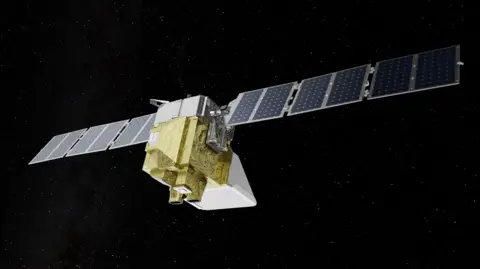$88m pollution-tracking satellite missing in space
 MethaneSat
MethaneSatAn $88m (£65m) satellite designed to detect releases of the planet-warming gas methane from oil and gas production, has been lost in space in a major setback for climate efforts.
The MethaneSat satellite which had backing from Google and billionaire Jeff Bezos, was launched only last year aboard an Elon Musk SpaceX rocket.
It was meant to collect data for five years on sources of the powerful greenhouse gas, which is responsible for nearly a third of human-induced warming, to help curtail the worst offenders.
The Environment Defense Fund, the NGO which oversees the satellite, said that communication was lost ten days ago and is currently undertaking an investigation into what happened.
Methane is the most potent of the greenhouse gases, and although it does not hang around in the atmosphere as long as carbon dioxide, it is 28 times stronger over a 100-year period.
Despite an international commitment to reduce methane levels by 30% by 2030, year-on-year it continues to rise with the target unlikely to be met, according to the European Space Agency.
The main sources of methane are from oil and gas production, farming and food decomposition in landfill.
But many of the current satellites that monitor it are operated privately, reducing transparency of who the worst offenders for methane release are.
MethaneSat came after years of development by the NGO Environmental Defense Fund (EDF) and once launched made much of its data publicly available, allowing scrutiny by governments and scientists.
It was backed by a consortium of tech giants including Google and billionaire Jeff Bezos, which together contributed $88m to the project.
The instruments used by the satellite are some of the most sensitive in the world, able to pick up much smaller sources of methane as well as "super-emitters".
Improving the sensitivity is important for detecting releases from agriculture which are often much more diffuse than from oil and gas production.
'Likely not recoverable'
Google said when it was launched it hoped its project would "fill gaps between existing tools".
The company was using its artificial intelligence tools to process the data and generate a global methane map.
But after just a year in orbit, in what was meant to be a five-year programme, communication was lost with MethaneSat.
The team at EDF suspect that the satellite has lost power and said in a statement "that it is likely not recoverable."
It went on to say that some of the software could be re-used but said it was too early to comment on whether a new satellite would be launched.
"To solve the climate challenge requires bold action and risk-taking and this satellite was at the leading edge of science, technology and advocacy," it added.
One of the other major publicly-available sources of methane data is hosted by CarbonMapper. One of its sources of data is the TROPOMI instrument aboard the European Space Agency's Sentinel-5P satellite. Although it continues to send back data its seven-year programme was meant to finish in October.
It is unclear how much longer it can continue to collect information, further limiting global efforts to track the greenhouse gas.

Sign up for our Future Earth newsletter to keep up with the latest climate and environment stories with the BBC's Justin Rowlatt. Outside the UK? Sign up to our international newsletter here.
